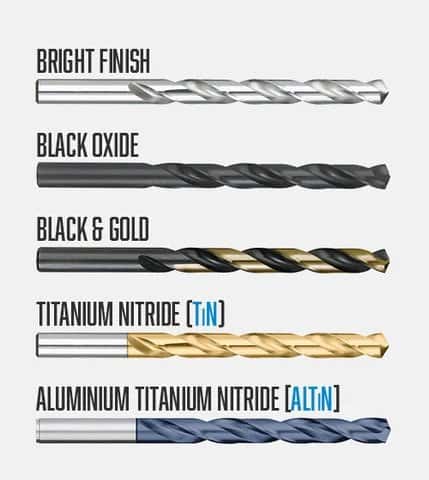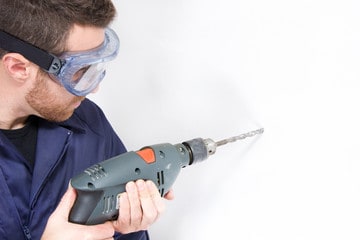Drill bit coatings are compounds that are applied outside of the drill bit. The most used drill bit coatings are black oxide, TiN (Titanium Nitride), TiCN (Titanium Carbonitride), and TiALN (Titanium Aluminium Nitride). These coatings are made with Titanium, Carbon, Nitrogen, Ferrus and Aluminum. Each of these drill bit coatings has specific physical and chemical properties. According to the properties variation, its usage can be varied. Due to the properties and usage, each of drill bit has advantages and disadvantages.
When using a coated drill bit, it can be damaged due to braking, drilling hard materials, and resharpening. Hence, coated drill bits should be used properly without damaging the outside coating. Coated drill bits are made with different materials, such as steel, HSS, and cobalt. These materials have different hardness and strengths. Therefore, the same drill bit coating can affect different ways in different drill bit materials.
What is Drill Bit Coating?
Drill bit coating refers to the application of a protective layer on the surface of the drill bit. This coating improves the drill bit’s hardness, reduces friction, increases heat resistance, and prolongs its lifespan. The most common types of coatings include Titanium Nitride (TiN), Titanium Carbonitride (TiCN), Titanium Aluminum Nitride (TiAlN), and Diamond. Each type of coating offers different benefits and is used for different applications. For example, TiN is often used for drilling into soft materials, while diamond coating is used for drilling into hard materials.
What are the Most Used Drill Bit Coatings?
The most used 4 types of drill bit coatings are black oxide, TiN (Titanium Nitride), TiCN (Titanium Carbonitride), TiALN (Titanium Aluminium Nitride). These drill bits coatings are applied on the HSS drill bits, and cobalt drill bits in order to reduce the friction, wear and tear resistance and improve the performance.

1. Black Oxide
Black oxide drill bits are commonly used for drilling into metal, wood, plastic, and other materials. They are typically made from high-speed steel or carbon steel and are available in a variety of sizes and shapes, including twist drills, spade drills, and hole saws.
One advantage of black oxide drill bits is that they are more durable than uncoated drill bits, which can help to extend the life of the bit. They also tend to stay sharper for longer periods of time, which can lead to more accurate and precise drilling.
Advantages of Black Oxide drill bits
- Reduce Friction in the cut
- Reduce heat reduction
- Improve the flow of material
2. TiN (Titanium Nitride)
The Titanium Nitride coating helps to reduce friction and heat build-up during drilling, which can also help to increase the speed of drilling and reduce the risk of the bit breaking or dulling. Using a TiN drill bit you can drill hard materials such as stainless steel, titanium, and other alloys. TiN-coated drill bits are gold in color and better than black oxide drill bits.
Properties of TiN Drill Bits
- Vickers Hardness – 2300 (81 RC)
- Relative Toughness – 3
- Oxidation Temperature – 550ºC
- Friction Coefficient – 0.65
- Thickness – 2-4 microns
- Surface Roughness (Ra mm) – 0.2
Advantages of TiN drill bits
- Increase higher RPM using this coating
- Better tool lifespan
- Add resistance
- Reduce friction
3. TiCN (Titanium Carbonitride)
TiCN (Titanium Carbonitride) drill bit is a coated drill bit. It can be used to drill hard and abrasive materials such as cast iron, hardened steel, and nickel alloys. TiCN drill bits are ideal for high-speed drilling applications where the bit is subjected to high temperatures and stresses. Normally, TiCN has a longer service life than other drill bit coatings.
Characteristics of TiCN Drill bits
- Vickers Hardness – 3000 (87 RC)
- Relative Toughness – 1
- Oxidation Temperature – 400ºC
- Friction Coefficient – 0.45
- Thickness – 2-4 microns
- Surface Roughness (Ra mm) – 0.17
Advantages of TiCN drill bits
- Increase hardness
- Add resistance
- Less maintenance
- Longer service life
4. TiALN (Titanium Aluminium Nitride)
Obviously, TiAlN coating has a unique structure that offers superior hardness and resistance to wear, which helps to increase the life of the drill bit. The coating also has excellent thermal stability, allowing the bit to operate at higher speeds and temperatures than other coated bits. Due to the hardness, TiAlN drill bits have a longer service life than other coatings. TiAlN is a violet-colored drill bit and is specially used for the hardest materials.
Characteristics of TiCN Drill bits
- Vickers Hardness – 3000 (87 RC)
- Relative Toughness – 1
- Oxidation Temperature – 400ºC
- Friction Coefficient – 0.45
- Thickness – 2-4 microns
- Surface Roughness (Ra mm) – 0.17
Advantages of TiAlN drill bits
- Increase hardness
- It can be used in higher temperatures.
- Lower thermal conductivity than TiN
What Drill Bits Can Be Coated?
You can coat the below drill bits using TiN, TiCN, TiAlN coating. The drill bit coating isselected according to the usage of the drill bit.
- Twist drill bits – Twist drill bits are the common type of drill bits and they can be coated with Titanium Nitride (TiN), Titanium Carbonitride (TiCN), Titanium Aluminum Nitride (TiAlN), and Diamond.
- Spade drill bits – Spade drill bits used for wood drilling and can be coated with TiN or TiCN to increase their durability.
- Masonry drill bits – Masonry drill bits are used for drilling into concrete and stone. They can be coated with TiN, TiCN, or Diamond for enhanced performance.
- Forstner drill bits – Forstner drill bits are used for creating flat-bottomed holes in wood, these can be coated with TiN or TiCN to improve their lifespan.
- Step drill bits – Step drill bits are used for drilling holes of varying diameters and can be coated with any of the four mentioned coatings.
- Countersink drill bits – Countersink drill bits are used for making a conical hole for a screw, these can be coated with TiN, TiCN, TiAlN, or Diamond.
- Hole saw drill bits – Hole saw drill bits are used for cutting large holes in wood or metal and can be coated with TiN, TiCN, TiAlN, or Diamond for better performance.
- Auger drill bits – Auger drill bits are used for drilling deep holes in wood, these can be coated with TiN or TiCN to increase their durability.
- Brad point drill bits – Brad point drill bits These are used for drilling into wood and can be coated with TiN or TiCN to
How to Damage a Coated Drill Bit?
Coated drill bits can be damaged when it is used on harder materials, broken, and sharpened. A damaged coated drill bit lost its thermal conduction properties and friction reduction properties. Therefore, the performance of the coated drill bit will be reduced.
Can I Sharpen a Coated Drill Bit?
Yes, You can sharpen a coated drill bit. When you sharpen a coated drill bit, there is a higher risk of damaging the coating. It will reduce the drill bit performance. When you sharpen the coated drill bit, you should not damage the outer coating of the drill bit. The outer coating helps to reduce friction and heat generation while it is used.

